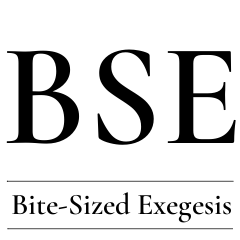In John 1:15 John the Baptist identifies Jesus in a way that is usually translated “The one who is coming after me ranks ahead of me, because he existed before me.” I propose that all three clauses should be translated temporally something like, “The one coming after me has existed since before me, because was first before me.”
Category Archives: Close Reading
Psalm 5: A Morning Devotional Prayer or Something Else?
The KJV rendering of Psalm 5:3 can give one the impression that this is a prayer of general devotion to be recited in the morning. However, a careful reading of the psalm shows that quite a bit more is going on here.
Principles For Reading Hebrew Parallelism in English
To get the most out of Hebrew poetry when reading it in English: (1) look for subtle comparison and contrast, not bland repetition; (2) look for layered parallels; (3) look for movement in the parallels. Want to know more? Read this article.
The Challenge and Importance of the OT’s Prophetic Poetry
Reading the poetic portions of the Old Testament in English, especially in the Prophets, can be challenging. But the fact is that the more familiar one becomes with the poetic sections of the Prophets, the more one sees that they are absolutely, vitally central to the NT. In the end, the way to make OT poetry interesting and understandable is not by retreating from it but by studying it even more intensely using all the imaginative and scholarly resources at your disposal.
Studying the Bible: To Love It is To Know It
To really know someone or something one must first love that someone or something. This applies both to human relationships and to Bible study.
Close Reading: Reading From Different Perspectives
It is possible to read a text from a perspective that seems unnatural to the text. In doing so what we actually do is critique ourselves as readers and force ourselves to see new things in the text. There are productive and unproductive ways to do this, but it can be useful for Bible study.
The Lord GOD Has Spoken – Who Will Not Prophesy: Amos 3:3-8
In Amos 3:3-8, the prophet uses a series of rhetorical questions to deliver a warning to Israel about the inescapability of God’s coming judgment. But he also tells us about prophecy itself – that it carries with it an implied invitation to repent and be saved from the otherwise inescapable judgment.
Reading Amos 2:4-5 in Context
The oracle against Judah in Amos 2:4-5 is typically regarded by scholars as a later insertion due to its use of Deuteronomic language and the apparent vagueness of its accusation. This article argues that dating a text late solely because of the presence of so-called “Deuteronomic” language is logically circular, and it proposes a reading of the first two chapters of Amos that makes the oracle against Judah an integral part of the passage’s rhetoric rather than an obligatory insertion.
When Word-For-Word is Not so Word-For-Word
Even someone as awesome as William Tyndale can make a mistake. And even as revered a translation as the King James Version can unthinkingly perpetuate it.
Principles of Bible Reading: From Text to Application
Good Bible interpretation is radically text-centered and moves from text to application. This involves avoiding confirmation bias, letting the Bible determine subject matter, and not insisting that every text be reducible to an ethical “action point.”




